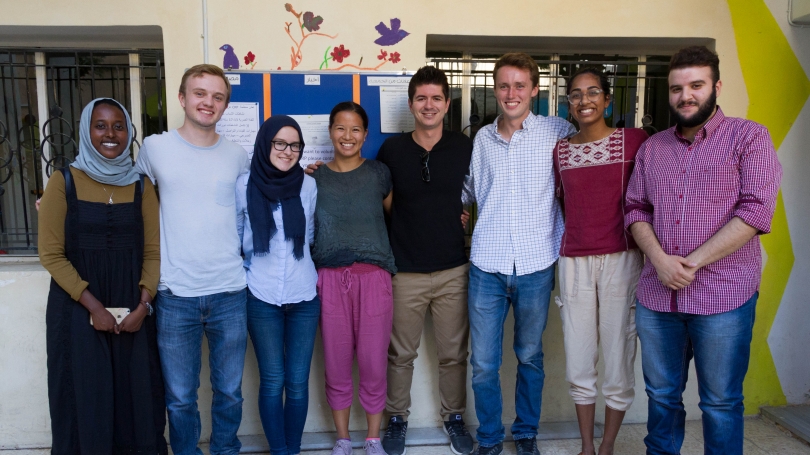
- About
- Programs
- Student Opportunities
- For Faculty
- News & Events
Back to Top Nav
Back to Top Nav
Back to Top Nav
Back to Top Nav
Back to Top Nav
During the summer of 2018, Matthew worked as a communications intern for the Collateral Repair Project (CRP), an NGO serving refugees in Amman, Jordan. CRP offers direct assistance to refugees, but much of its work centers around rebuilding communities. Matthew had a variety of responsibilities including; interviewing people at CRP's community center, writing articles and blogposts, maintaining a social media presence and teaching an English class.
By Matthew Magann '21 Class of '66 Named Intern
Collateral Repair Project runs a community center in Hashemi Shamali, one of Amman's poorest neighborhoods and one home to many Iraqi and Syrian refugees. The organization is still young, and in the past few years it has expanded rapidly. CRP is currently preparing to open a second community center, primarily aimed at Sudanese and Yemeni refugees, in Amman's downtown. CRP is community-based, and I absolutely saw the benefits of that. Many of the staff members are refugees from Hashemi Shamali, and in my work there I saw how much CRP stresses placing beneficiaries at the center of its operations. CRP runs a number of programs. Direct aid is a big component; CRP distributes food vouchers, school supplies, and other essential items, since refugees cannot legally work in Jordan and thus rely on CRP to meet their basic needs. Other programs focus on skills and community building and range from English classes to children's activities.
I worked in the communications office at CRP. We had a three-person communications team, including two other interns, though other people often helped out. We were responsible for coming up with and creating content for CRP's blog, social media pages, and other communications. In the course of my internship, I got to join many of CRP's activities and speak with participants about their experiences. CRP makes a point to highlight refugees' stories in its communications material, so almost everything I wrote or photographed involved meeting some new person in the community.
Most of my work was in an office at CRP's community center. I worked at least four days a week, sometimes five, from 10:00 a.m. until 5:00 a.m. I shared an office with as many as eight other people, depending on the day. That environment lent itself to collaboration, and most things ended up as a team effort. CRP only has a few paid employees, so most of the work usually done by paid staff is left to interns. That gave me a chance to have real input on the day-to-day operations at CRP. Internship positions are fairly selective, and every one of the interns I worked with devoted him- or herself to the work – people who come to CRP believe in the organization's mission, and that acts as motivation enough. The passion that my coworkers and I shared made for a great work environment.
I know I want to keep studying the Middle East. Living in Jordan helped me contextualize a lot of the knowledge that I had about the region, but it also brought up more questions. More than anything, my time in Amman changed the way I understand the Middle East, and more broadly how I understand the world. I've finally decided to pursue a Government major alongside my Earth Science major. I had considered it for a while, but my time in Jordan convinced me that I had much more left to understand. I'm glad I spent my summer in Jordan – it really changed the way I see things. And of course, I want to thank everyone at the Dickey Center. I could never have had this experience without the grant I received, and for that I'm extremely grateful.